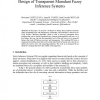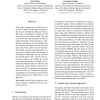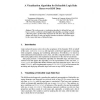106
click to vote
IJAR
2008
15 years 2 months ago
2008
The two most important models of inferencing in approximate reasoning with fuzzy sets are Zadeh's Compositional Rule of Inference (CRI) and Similarity Based Reasoning (SBR). ...
134
click to vote
ECAI
2010
Springer
15 years 3 months ago
2010
Springer
Logic programs under the stable models semantics, or answer-set programs, provide an expressive rule based knowledge representation framework, featuring formal, declarative and wel...
KRDB
1998
15 years 3 months ago
1998
Previous researchers note the problem for semantic optimisation of database queries caused by its production of a large number of semantically equivalent alternative queries, from...
111
click to vote
HIS
2003
15 years 3 months ago
2003
: In this paper, we propose a technique to design Fuzzy Inference Systems (FIS) of Mamdani type with transparency constraints. The technique is based on our Crisp Double Clustering...
134
click to vote
EUSFLAT
2003
15 years 3 months ago
2003
This paper suggests an evolutionary approach to design coordination strategies, a key issue in distributed intelligent systems. We focus on competitive strategies in the form of f...
133
click to vote
FLAIRS
2006
15 years 3 months ago
2006
In knowledge engineering research the refinement of manually developed intelligent systems is still one of the key issues. Since scoring rules are an intuitive and easy to impleme...
115
click to vote
SEKE
1994
Springer
15 years 6 months ago
1994
Springer
We describe a technique for the control of production rules firing in an object-oriented setting. This technique is based on the separation of control rules from ordinary domain r...
145
click to vote
EWMF
2003
Springer
15 years 7 months ago
2003
Springer
Abstract With the ongoing shift from off-line to on-line business processes, the Web has become an important business platform, and for most companies it is crucial to have an on-...
115
click to vote
IRI
2006
IEEE
15 years 8 months ago
2006
IEEE
—The transformational methodology described in this paper induces new knowledge, which may be open under any deductive process. The method of transposition is used to maintain a ...
111
click to vote
RR
2007
Springer
15 years 8 months ago
2007
Springer
This work presents a visualization algorithm for defeasible logic rule bases as well as a software tool that applies this algorithm, according to which, a directed graph is produce...



